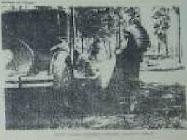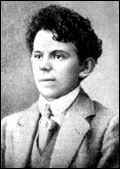The groundwork was laid for my interest in Mandelstam when I was in high school, in the 60s. Russian literature was Nabokov, Tolstoy, Gogol, Dostoevsky. The swampy, forested, birch-laden landscape of northern Minnesota, where I spent a lot of time then, was mirrored in this literary Russia. Nabokov was a favorite of my mother, & most of his books were on the shelves at home. Reading "Speak, Memory", Nabokov's childhood memoir, was an exercise in vicarious nostalgia (no one understands heartsickness for childhood like an adolescent). My high school prose writing included awkward Nabokovian echoes.
Once, much later, I wrote a 3-part poem exploring my absorption in Nabokov. Several years after that, I heard Joseph Brodsky give a stupendous reading at Brown (he recited his fairly long poems in both Russian and English, all from memory). The sloped auditorium was jammed. Brodsky took questions afterwards, & he raised a laugh when I asked if he had a favorite poem by Mandelstam. He said, "Yes, I do. Next question." After the reading, however, we talked. I apologized for "putting him on the spot" about Mandelstam. He was very charming and affable. He encouraged me to read more Auden. He even accepted a few of my poems, saying it would give him something to read back at his hotel.
When Brodsky died a few years later, I took the poem I had started about my obsession with Nabokov, and simply replaced the first section with a tribute to Brodsky. The last section (about the boy with the moth) worked very well - since Brodsky himself had written a poem based on this episode - which first appears in a short story by Nabokov. The Brodsky poem is also an echo of his tribute to Eliot, which was an echo of Auden's tribute to Yeats. I enjoyed adding another spoke to this elegiac cycle (English-Irish-American-Russian-American. . .). The poem was published on the op-ed page of the Providence Journal, the RI paper of record - where, incidentally, and curiously enough, Yeats himself had published a series of literary essays back in the 1890s.
Here is the poem:
JOSEPH BRODSKY
But each grave is the limit of the earth.
1
You died on a cold night in January.
It was Superbowl Sunday. A supine empire,
preoccupied with bread and circuses,
Land Rovers, stratagems of muscle-
bound heroes. Next day, fire
swallows the famous opera house in Venice.
Not with a bang - with a light rustle
of red silk, your heart passed the final
exam, black-sailed, in the science of farewells.
Snow falls on the fleeting moiré of the sea;
It falls on horsemen passing by, on the halfbacks
of the dolphins' curved smiles (in a mirror
of alien tribes). Snow falls on night grass
in the trackless pine forest; it falls with the stars
drifting down from unnumbered, shiftless heaven;
so it fell, and will fall, on those bronze eyelids.
A guarded glance, coiled in frozen hexagons;
shy cedar voice, immured in pyramids.
Snow mixed with tears signals a hearth somewhere.
Not in the street, not in this Byzantine air
of columns and cenotaphs - no. Just a home
by a river of marrying streams; a certain Rome
where tongues descend - ascending voices mingle
in companionable flame. This friendly fire
eats brotherly dusk, shakes fearful ether
into evening wine. . . one hawk's cry
screams - and melds into the Muse's profile.
2
Life's flimsy laundry, easily
unraveled. Transparent butterfly net,
wing of a moth, how slyly they
trap the hunter, iced on an alpine sheet.
You fight the droning in your head
with all the cunning you can muster;
turning its power against itself, you lead
a life Laertes would approve (bluster,
business laboring for acclaim)
only to drown the voice above the trees.
Relentless, impervious to shame,
it finds you out, brings you to your knees.
And like the heavy signet ring,
a chieftain's ring, that hidden in hand
sealed Hamlet's heart (O molten, circling sting) -
the droning issues forth its stark command.
You listened, followed. A shuttling pencil
in a nighthawk's beak - a spear in your side;
and a huge sea-moth with crossbone stencil
shattered your lamp. Died.
Summer ends, the droning subsides.
The ruthless tango of prose and poetry
is dead. Cicada shells, butterfly hides. . .
some leftover spider's ecstasy.
3
In the depths of the Soviet winter, in the ponderous cold
of Siberia, a boy cups an abandoned moth in his hands,
born - to die a few hours old -
into a false firewood springtime. Its delicate wings
are only an affront to the divine benevolence; he understands
nothing; his hands, like an insect coffin, bear the stings
of the nails themselves; like a dry cocoon, absently,
they drift to the shack wall, and the fingers fan,
in unison, a camouflaged figure in the pinewood pantry.
This tender sign. . . a tenderness snuffed out.
This heavy icon, then. . . true mimic of an action?
Or only the swollen, distorted wings of a parasite?
Or only the screech of broken chalk on slate?
Droning brittle wings, poets take their stations
at the edge of the cliff - their noise intuitive, innate. . .
The butterfly is gone. Its form was here, immaculate;
the hands tracing its flight, aimless, serpentine,
mimic its undetermined motion - late, late -
since that double-woven fountain, afloat with indirection,
surging, sparkling, translucent, seeks its mate
in a signal heaven - a camouflage beyond dissection.
2.2.96
Now when I re-read it, the solemn tone and the heavy allusions to other poems almost wreck it, maybe do wreck it; but the last section lifts it up & together again, or almost.
1.09.2003
Labels:
Brodsky,
elegy,
Mandelstam2,
Nabokov,
Russian poetry2
Subscribe to:
Post Comments (Atom)



No comments:
Post a Comment